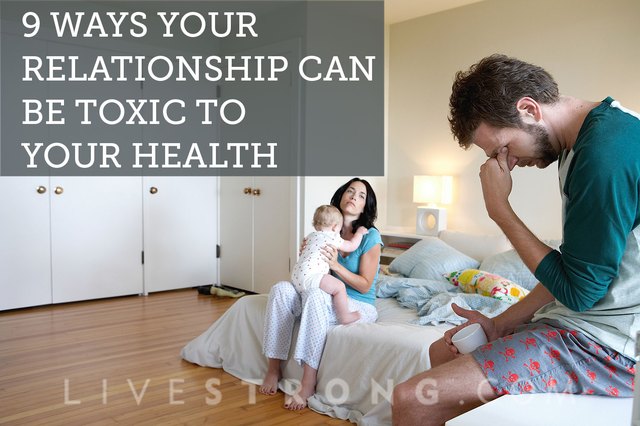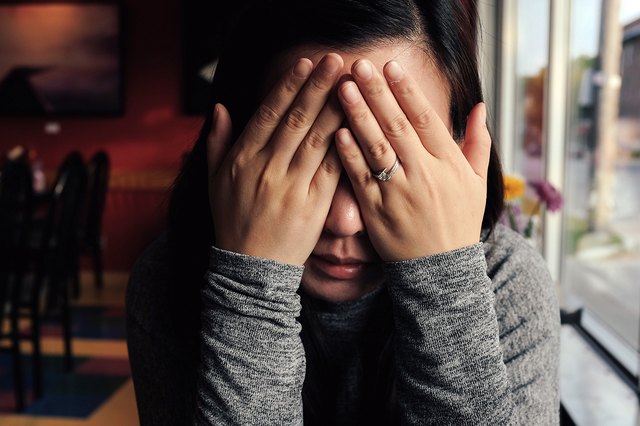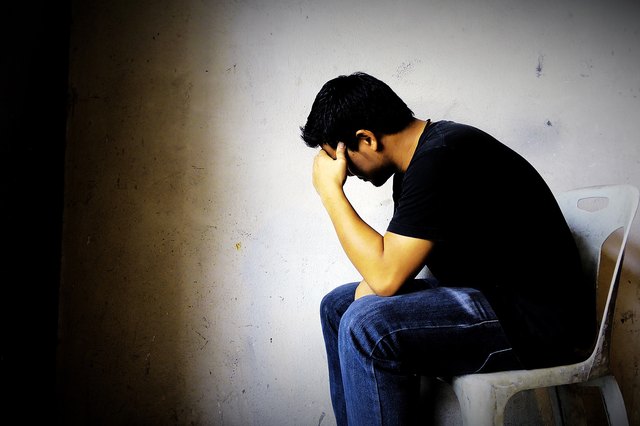There is no fairy tale in Hollywood. Every relationship has its ups and downs, which any healthy and loyal partner will admit. However, there is a clear line between the rough road and the relationship between pain and negativity. Although many studies have shown that a supportive relationship can be good for your health - from healthy behavior to general longevity - sustained stress from a toxic tangle can attack your health in ways you may not be aware of. Read on to see how an unhealthy relationship can affect your overall well-being.
Credit: Noel Hendrickson / digital vision / gett stress and negative emotions are part of a person's overall decline in heart health. A recent study at Michigan State University found that heart problems increased by 34% in people with toxic relationships, while a study at the University of Copenhagen found that two-thirds of people died 11 years later in ongoing conflict than those without. The findings are supported by another recent study on women with coronary heart disease or stroke, published in the Journal of the American Heart Association. Dr. kiari Kershaw, M.D., Northwestern University, found that in many cases, women with high social pressure have poor heart health, 12 times more likely to have coronary heart disease, 14 times more likely to have stroke, and 5 times more likely to have coronary heart disease. Related: you can develop 9 habits from people with intelligent emotions. The risk of anxiety and depression increases [ people in stress relationships are more anxious and depressed than people in love and support relationships, according to marriage counselor Dr Mary Ann Mercer. In fact, Dr. durvasula has noticed that the consequences of unhealthy relationships can include a reduction in self-esteem, which often leads to depression and anxiety. If our relationship is not good, we will devalue ourselves - when we devalue, we will not take care of ourselves, "she said. Depression and anxiety can lead to a large number of physical conditions, making us prone to disease and chronic inflammation. related: 8 warning signals of depression, you should not ignore the correlation: how to establish a clear boundary with energy vampires many people turn their disordered interpersonal relationships into emotional diet. They often look for foods with high carbohydrate, high calorie and low nutritional value, even if they are not hungry. "I find that when people give up their health or gain weight, it's a sign of conflict in a relationship," Dr. Mercer said of her observations in her own practice. People start eating because it's a passive, aggressive way to deal with a partner in question. It can lead to obesity and even food addiction. correlation: the reason why fomo is not allowed to rule your social life "arguing with your partner is not only harmful to your relationship, but also to your brain," Dr. Mercer said. There are many studies that show that if you are in a conflict relationship, chronic health problems can occur over time. "One of the chronic problems is a hormonal imbalance called adrenal fatigue, which occurs when stress hormone cortisol constantly rushes into your system. Living in a belligerent atmosphere can trigger adrenaline production, fight or escape reactions, and behind these reactions are overworked adrenals, which cannot properly regulate the release of other hormones. In her book the secret of hormones, Dr. Tami meraglia wrote: "the study of excessive cortisol in inhibiting the immune system, increasing blood sugar and producing inflammation. correlation: 7 the change now is to live longer and look younger. Dr. Mercer also noticed that people who came to the treatment often mentioned sleep problems. " We found that the more conflict they had during the day, the more pressure they had. "Their brains work a mile a minute," she said. The relationship I'm talking about is unsafe, or worrying, and it's related to poor sleep patterns. Sleep problems are triggers for anxiety and anxiety. "Recently, an independent study reported that sleeping less than six hours a night on average increases the risk of early death, not to mention Alzheimer's, diabetes and heart disease. correlation: 11 kinds of sleep destroying habits. (and how to fix them) Credit: Twenty20. COM / @ cburtonsiller when people feel bad about themselves, they tend to choose partners, so that they are in unhealthy and enabled mode. This may mean choosing a abusive sexual partner, or a partner who drinks or takes drugs. These types of relationships create patterns that make it harder for healthier partners to break free. A study funded by the National Institute of alcohol abuse and alcoholismThe study concluded: "alcoholic couples may be more tolerant of alcohol related negative experiences because of their own drinking habits." This means that two people who have a drinking habit are more likely to fall into a downward spiral together, because they can both have unhealthy patterns. correlation: 8 signs indicate that you need digital detoxification related: what can you do today? Your future self will thank you for your contribution: How do you think about David's loss / digital vision / Getty's correlation: 10 ways to learn to love yourself more 1. Dr. Timothy loving, founder and professor of love lab, studied the negative effects of long-term toxic relationship on the immune system. His team looked at how couples talk about differences. " Show signs of weak immune function to couples who are hostile to each other, more negative or more serious, or who are in a position to withdraw from the other. "For those patients trapped in toxic relationships, Dr. Ramani durvasula, a leading psychologist and author of a forthcoming relationship book," should I stay or should I go? "I've also noticed changes in my body." It happens in biology, "she said. People in a toxic relationship are more likely to get sick than people in a healthy relationship. " strong> correlation: your partner has a sign of an emotional event, credit>: ,>,> 2. Heart health


5. Emotional diet

6. Adrenal fatigue

8. Toxic priming mode

9. Dr. P. Mercer mentioned the relationship between cancer and negative psychology, but warned that this does not mean that a toxic relationship may be the cause of cancer, which is often associated with systemic inflammation. Studies have shown that people with negative, pessimistic and depressed emotional states are more likely to have heart disease and cancer. Mercer points out that although a person can have this personality, regardless of their relationship, events in a person's life can also affect his or her views. In fact, a 2011 UCLA study found that negative social interactions are related to proinflammatory cytokine activity, which affects the immune system's response to diseases such as infection, cancer and sepsis.
? Are these health effects surprising you? Have you ever had a toxic relationship? What are your suggestions for reducing health effects? Please let us know in the comments.









